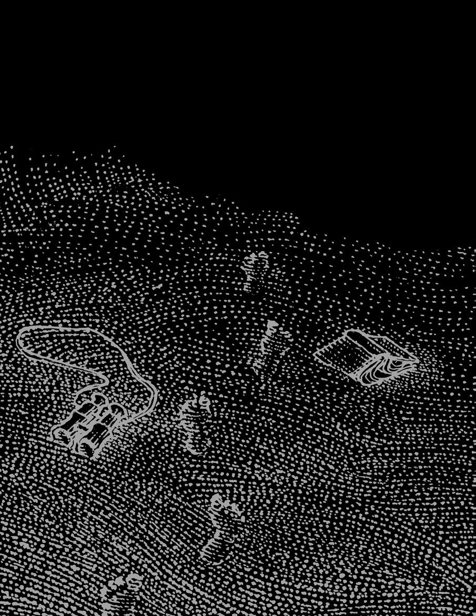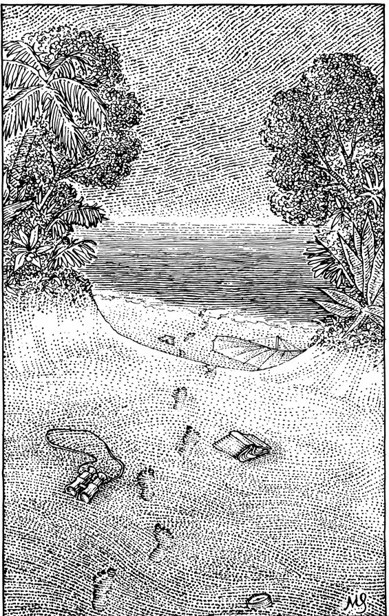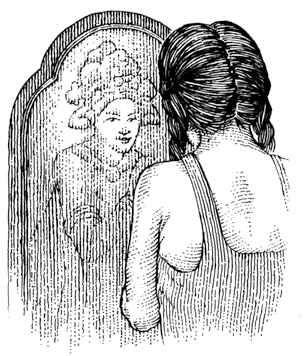A Field Guide to Lucid Dreaming (36 page)
Read A Field Guide to Lucid Dreaming Online
Authors: Dylan Tuccillo,Jared Zeizel,Thomas Peisel

three . . . I’m dreaming . . .” This will help focus your mind
while your body does its thing.
b
Be careful of false awakenings.
A common phenomenon
known as a false awakening occurs when you mistakenly think
you’re awake, when you’re actually surrounded by a very realis-
tic dream. Personally, we’ve been sitting in bed, writing in our
dream journals and apparently awake, only to wake up again
and see the page blank! Always perform a reality check and
make sure. Are you dreaming?
=
226
<
�
Summary
• If you want to have a lucid dream at will, learn how to perform
a WILD.
• A WILD involves falling asleep consciously, letting your body fall
asleep while you, that is your consciousness, remains aware.
• Practice spending time in the twilight state: it’s the springboard to
your lucid dreams.
• Relax and let your body do what it normally does while you
focus passively on the images ahead of you. Wait until one of
the images becomes clear and move toward it.
=
227
<


P a r t S i x
The NexT
FroNTier

Welcome to the end. You’ve been to a lot of places
and have seen many things. But wait—don’t unpack
your bags, don’t let down those sails, you’ve only just
begun. As the captain you can take control of your ship and ven-
ture farther into a world of limitless possibilities. There are places
to uncover, things to do, ideas to experiment with, and discoveries
to be made.
When we first set sail to the dream world, we were like fresh-
men at a college mixer. There was flying, anonymous dream sex,
fireball battles, and all-around good fun. We’re not ashamed of
these activities. Once the limits of the waking world were lifted
there were just some things that we had to try. Biting our thumbs
at gravity, seducing jungle harpies, and traveling into space were
all liberating experiences.
Then sophomore year rolled around and we turned to lucid
dreaming to help with our waking life problems. The practices of
defusing nightmares and incubating dreams enriched our lives and
made us feel more whole. Our journey went from fun to profound.
Then it was time to graduate. It was time to go beyond the
personal into the transpersonal. We took a break from being enter-
tained and ventured out into the unknown. As we traveled toward
the horizon, our viewpoints and philosophies were challenged.
Now we invite you to explore the bigger picture. Let’s probe
the true nature of dreams. Let’s learn more about ourselves. The
dream world and the waking world seem like completely different
realities, but let’s examine how these two worlds intersect. Finally,
we’ll see how lucid dreaming could very well change our entire
culture and society.
So far, we’ve gone on a lot about how to dream, but maybe the
more important question is why we dream.
=
231
<
19
Know Thyself
<•=
It is wisdom to know others;
it is enlightenment to know one’s self.
—Lao-tzu,
writer, philosopher, incredible beard
The Journey
Legends, myths, and stories of old tell of a hero’s quest to mas-
ter and overcome challenges, to find the treasure, or save the
town from peril. But the classic journeys are not just entertaining.
As Saint Catherine of Siena said, “Heroes take journeys, confront
dragons, and discover the treasure of their true selves.” You are
the hero in your life’s story, and your journey will take you to the
greatest treasure of all: self-discovery.
=
233
<
The Royal Road to Your Unconscious
“The interpretation of dreams is the royal road to a knowl-
edge of the unconscious activities of the mind.” When
Freud said this, he was speaking about a deep underlying part of
the human psyche. He was convinced that there is some deeper
part of ourselves that contains our repressed memories, underly-
ing thoughts, beliefs, and emotions. We are unaware of this place,
but it still influences our actions and feelings in waking life. Freud
believed the role of psychotherapy was to uncover this “uncon-
scious” and bring it to light. By integrating the conscious mind
with the subconscious mind we can radically transform our lives,
he thought.
Why do we act a certain way? Why do we sometimes find
ourselves in recurring situations or circumstances? What are the
internal blocks that keep us from living life fully? Our lives are
sculpted by our internal worlds. But if we are simply a product
of our imaginations and all that hidden stuff, how do we take
control? If only there was some tool to uncover our own hidden
thoughts and feelings.
You know what we’re getting at here. Dreams can act as a mir-
ror to our subconscious minds. When we look back on a dream
the morning after, we are taking a peek at our inner life. Swirling
in our heads we see habits, thoughts, fears, and recurring patterns,
coded in the language of the dream. By seeing these elements, and
bringing them into our awareness, we’re pulling them out of our
subconscious and introducing them into our conscious minds.
As Freud’s successor Carl Jung stated, “Man’s task is to become
=
234
<
conscious of the contents that press upward from the uncon-
scious.” Looking within and exploring our inner universe is a way
to learn more about ourselves and become whole, believed Jung.
We couldn’t agree more.
Sure, regular dreams can definitely reveal some interesting
things going on within you, but what about lucid dreaming? With
self-reflective awareness in the dream state, we can communicate
directly with the vast landscape of our minds. While lucid, we’re
able to engage with what many people call the Self (aka the higher
self, the subconscious self, God, the soul, the Universe—call it
what you will).
Lucid dreams can lead to incredible insights. They can help
you find your way along this crazy path of life. Next time you find
yourself conscious inside a dream, ask some questions and make
use of the vast wisdom of your own subconscious. Here are some
tips:
b
Look for a guide/spirit animal.
It doesn’t matter if it’s an animal, a person, or a paper airplane. Whatever form it takes, an
ally can be a great help when exploring your inner world. Pose
questions to your guide or ask it to take you to a meaningful
location.
b
Interpret the dream
inside the dream.
You don’t have to wait until you wake up to interpret your dream. Think of your subconscious as a wise old man, your own personal Mr. Miyagi.
Ask the dream for insights and then observe what your sub-
conscious reveals to you, interpreting the events and characters
=
235
<
of your dream as they unfold. A great thing to say once lucid
is, “Show me what I need to know,” and sit back and observe.
Use your intuition to interpret the dream. Make it a stress-
free, creative endeavor.
b
Think outside the box.
Don’t be shy—quit twiddling your
thumbs and ask the big questions. Examine your own beliefs
of space, time, intuition, and awareness, and then challenge
those beliefs, if only for fun. Don’t be afraid of sounding like
a mustachioed philosophy major either. Ponder the existential
puzzles like:
• Who am I?
• Where am I?
• What is God?
• What’s time and space?
• Am I my body?
• What does my soul look like?
• What the hell happens when I die?
These questions are classics for a reason.
b
Observe the dream environment.
The location you find your-
self in is a reflection of you. You can observe and even engage
with the elements of the dream that surround you to learn
more about your inner workings. Do you find yourself in a
busy city street, near a peaceful lake, in a familiar home, per-
haps? The environment you find yourself in during a dream
=
236
<

is no accident. If, for example, you find yourself in a house,
explore the different rooms. Take note of the decor, the upkeep
of the house, or even the size of the space itself.
Walk upstairs and explore the attic; maybe you’ll find
some lofty ideas. Venture underground to the basement and
seek out hidden memories. Don’t just stand there, engage your
environment and ask it to reveal its secrets to you.
Mirror Mirror
The day came when the risk to remain tight in a bud
was more painful than the risk it took to blossom.
—Anaïs Nin,
French-Cuban author, one of the finest writers of erotica
<•=
Just as we look into a mirror to get dressed, to check our hair,
or to pop a pimple, our dreams are a tool for us to see our
own reflections. On a superficial level, we may look into a mirror
on some mornings and notice that we look like crap. That may
compel us to shower, shave, change our clothes,
etc. Without the mirror, we wouldn’t know how
to change. Likewise, what happens when we
look into our dreams and find ourselves
distorted in ways that we don’t find
attractive? “Why did I beat that old lady
to a pulp in my dream?” you ask. “What
